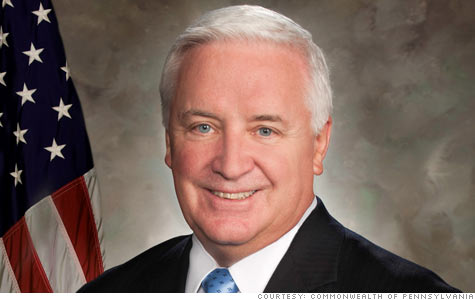HARRISBURG – Gov. Tom Corbett’s 2014-15 budget proposal invests more than $34.4 billion in total funds for health and human services programs to help those who need it and to provide a sustainable foundation to increase access to quality, affordable healthcare for more than 500,000 Pennsylvanians under his Healthy Pennsylvania plan.
In addition to advancing the Healthy Pennsylvania plan, it reaffirms a commitment to preserving the safety net for individuals with intellectual and physical disabilities, seniors, children and low-income families.
“The smartest investments we make are the ones we make in people,” Corbett said. “We’re committed to helping those who need it most.”
The proposal puts Pennsylvania’s Medicaid system on a stable path for the future, with a focus on better matching benefits to healthcare needs, creating quality outcomes, supporting increased personal responsibility, and increasing access to care through a Private Coverage Option.
“Currently, one in six Pennsylvanians, more than two million people, are on Medicaid, and the annual cost to Pennsylvania taxpayers and the federal government is more than $22 billion,” Secretary of Public Welfare Beverly Mackereth said. “Our Healthy Pennsylvania plan doesn’t just look at how we spend our money, but at how we can better invest it in a strategic way.”
The proposed budget also invests in resources to serve more individuals who have been waiting to access needed services, allowing them to stay in their homes and communities, and it supports the infrastructure and practitioners needed to expand access to primary care services in rural and underserved areas.
Health and human services investments in the proposal include:
Reforming Pennsylvania’s Medicaid Program: Accounts for $125 million in savings from the implementation of reforms to the Medicaid program and the implementation of the Private Coverage Option within the Healthy Pennsylvania Medicaid waiver; assumes approval of the waiver by the federal government.
Increasing Support for Community Health Centers and Health Care Clinics: Doubles the investment last year to provide $8 million to Pennsylvania’s community-based healthcare clinics and fund four additional health centers and clinics in addition to 36 existing health centers and clinics.
Expanding Access to Primary Care Services in Rural and Underserved Areas of Pennsylvania: Increase of $4 million for loan repayment assurance to healthcare practitioners working in primary care in rural and underserved areas, which will provide an additional 70 awards to physicians, dentists and other practitioners. Also provides funding for 12 new residency slots for medical school graduates who are legal Pennsylvania residents, or who have completed their medical school education in Pennsylvania and who commit to providing primary care in a rural Pennsylvania community upon completion of residency training, to help address the growing primary care shortage in our rural areas.
Expanding Services for Older Pennsylvanians and Individuals with Physical Disabilities: Increase of $41.5 million in General and Lottery funds to serve:
- An additional 1,764 older Pennsylvanians through the Medicaid Home and Community-Based Aging Waiver ($11.6 million);
- An additional 800 individuals in the LIFE program ($9.4 million);
- An additional 500 individuals on the Options waiting list ($1.1 million);
- An additional 204 individuals who transfer from the Department of Public Welfare’s Attendant Care Program at age 60 ($1.4 million); and
- An additional 1,599 individuals with physical disabilities in community settings ($18 million).
Expanding Services for Individuals with Intellectual Disabilities and Autism: Additional $23.5 million to provide home and community-based options for:
- 700 young adults who are graduating from the special education system to continue to live independently in the community;
- 400 individuals who are on the emergency waiting list to access crucial services to keep them in their homes and communities; and
- 100 adults with autism spectrum disorders.
Moving Individuals from Institutional Care to Community-based
Care: An additional $5.4 million to increase community placement for individuals currently in state mental hospitals and state intellectual disability facilities, enabling the transition of 90 clients from state mental hospitals to progressive mental health treatment in home-like settings and 50 clients from state intellectual disability facilities to home and community-based settings.
Domestic Violence and Rape Crisis: Increase of $2.2 million for services dedicated to victims of sexual and domestic violence.
Child Care Assistance: Increase of $15 million in federal funds to allow an additional 2,895 children currently waiting for services to receive child care assistance.
Children’s Health Insurance Program (CHIP) Enrollment and Outreach: Increase of $9 million to serve more than 10,000 additional children in the Children’s Health Insurance Program, assisting in the Healthy Pennsylvania goal of insuring all kids in Pennsylvania.
Child Advocacy Centers: $2 million for the support and expansion of Child Advocacy Centers in Pennsylvania, supporting a recommendation from the Task Force on Child Protection.
